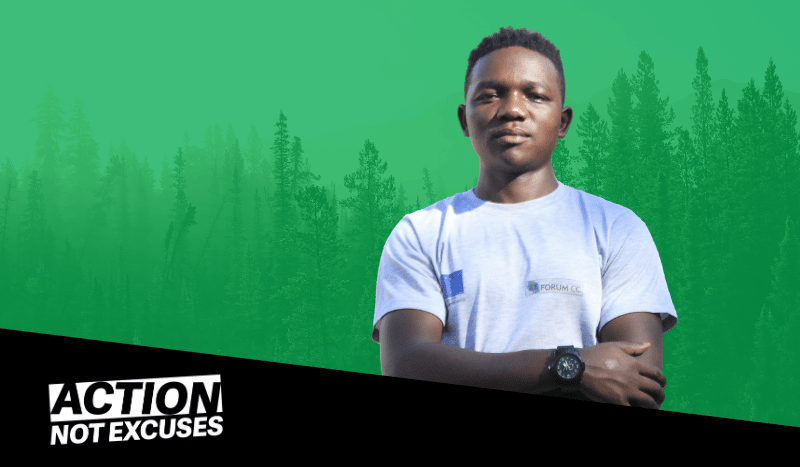Elibarick’s story: Learning about climate change wasn’t a choice for me. It was a reality.
Elibarick, 25, is an environmental activist from Tanzania driven to tackle the negative impacts of deforestation.
Learning about climate change was not a choice for me.
In the last four years in Tanzania, we have seen the negative impacts more than ever before. Mt Kilimanjaro, Africa’s highest peak, is losing its snow. Sea levels are going up, trees are coming down. I saw the challenge we face and realised I have a duty to tackle this, to tell my community that climate change is happening now.
Tanzania is losing more than 500,000 trees each year – for a variety of reasons, but all avoidable. It is contributing to so many other elements of climate change, including putting communities more at risk of natural disasters. What I am really excited about as the Reverse Deforestation Youth Champion for Action Not Excuses is our commitment to plant 10 million trees.
It is for us to show communities the way forward.
Here in Tanzania, we have an economy of food production. Temperatures are rising, land is being hit by both floods and droughts and people are finding themselves in poverty. But the government does not acknowledge climate change to be a cause. Although we know climate change is well reported, we are working within a system that does not acknowledge it.
So, in the absence of our government being more proactive, it is on us to show communities the way forward. We must work on sustainable agriculture, irrigation, tackling the harmful elements of our lifestyles that are contributing to climate change. It is not that the public do not understand – but they do not feel the urgency like we do.
Planting 1,000 trees to give young people a climate education.
It is important to me to keep taking practical actions. On International Volunteer Day, 5 December 2020, we held a tree planting event in communities outside Dodoma. We planted 1,000 saplings – and involving the local government and local leaders to make sure they are seeing our commitment to taking things into our own hands.
We surveyed the local community to see where the most effective places would be to reforest. We chose a few local schools and community areas – the reason being that when people have engaged with planting trees, when they have engaged with caring about the environment, they are more likely to be invested in seeing them thrive.
It is the best form of environmental education we can provide.
What we really need is investment on green technology.
I am one single youth activist. I can work to influence my community but it is world leaders who truly have the platforms. It is time for those platforms to be shared so we can take advantage. We need them to trust us and invest in us. I would like to see nations outside Africa take interest in youth platforms here in Africa and support our work.
And speaking of investment, we need access to new technologies. We are more than developing countries here in Africa. There’s so much potential for solar, for reforestation, for recycling, across this continent, but without the collaboration of richer countries our progress will be limited. Fighting climate change will be expensive. But the cost will be nothing compared to the price of not acting.
Covid-19 has shown us governments can take action quickly.
It is funny, when the pandemic arrived, we saw how quickly and effectively governments can act. Everyone was taking action – to protect ourselves, our families, the nation, the world. Every world leader was talking about the issue within weeks – and not just talking but doing, too. If this is possible, then it should be the same for environmental issues.
Climate change is an emergency. It is not just something to talk about and ignore. I hope that political leaders can start treating it with the same urgency as we have treated coronavirus. They need to introduce green taxes on industries that are not sustainable. We need to find ways for business to continue to make money without doing harm.
We need to bring new ideas not old weapons to the climate battlefield.
If we really are going to the climate battlefield, we need to bring new ideas not old weapons. And what that means is having tools to show the work that we’re doing. Convincing others by sharing examples of the real-world things they can do to help the planet. We need sustainability checklists showing people the actions that they can do in their own lives.
Half of Tanzania’s population are aged under 25. We have got a huge youth generation and a huge campaigning opportunity to truly influence political policy. For this to be successful, we need policymakers to hear us shouting that we are in a climate emergency and that our outdated policies not fit for our 2020 world are failing to protect us and our planet.
There is no time to wait until tomorrow.
Our generation will feel hardest the impact of climate change. And yet we are the one generation with the greatest power to combat those impacts. If the people who are in power are not listening, then it is our duty as the youth to tell them to listen to the science. Tomorrow is too late. We need Action Not Excuses. Join us today. Stand with other young people.
Need more information about Expedition?
Consultation call
Whether you have a specific question or want to discuss which Expedition is right for you, schedule a call with a member of the team at a time convenient to you.
Join an info event
On our monthly online info events, we’ll tell you all about Expedition. Have your questions answered, meet other volunteers and find out what Expedition is really like from an alumni.
Download a guide
Find out all about Raleigh International and Expedition in our helpful information guide.






